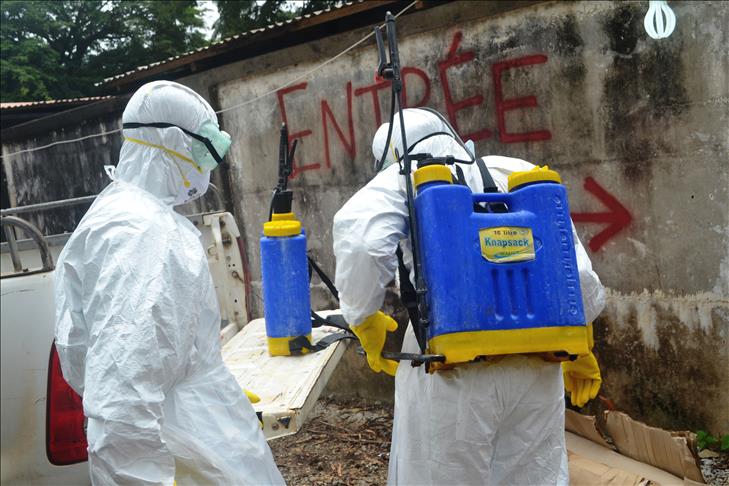
By Evelyn T. Kpadeh
MONROVIA
With all energies presently directed to the fight against the deadly Ebola virus, many Liberians with HIV are living in fear due to the unavailability of adequate healthcare services.
"We agree Ebola is real and it's in Liberia, but, being HIV-positive, it's not an easy thing," Cynthia Qua-qua, head of the Liberia Women Empowerment Network, an NGO for women living with HIV, told Anadolu Agency.
"It's a big blow to us because everyone's attention has been drawn now to Ebola," she said.
Ebola, a contagious disease for which there is no known treatment or cure, has killed at least 2,803 people in West Africa in recent months, including 1578 in Liberia alone, according to the World Health Organization.
Since its second outbreak in March of this year, many of Liberia's major hospitals have shut due to health workers' fears of coming into contact with Ebola infected people.
HIV-positive people in capital Monrovia and its surroundings can now only access needed drugs at the offices of the National Aids Control Program rather than at their various treatment centers as before.
This forces many to travel long distances in order to obtain their medical needs.
"I have been on the medicine for 11 years," said Qua-qua. "If I [stop] taking my medication, it will be very bad for me because HIV is a lifetime thing."
"We need to take our drugs every day," she added.
Qua-qua fears that many of those living with HIV could die since they could not access full HIV treatment care and services. She said HIV-positive people were currently only receiving ARV and ART drugs and were not being subject to regular check-ups.
Qua-qua explained that treatment from infections and regular CD4 cell counts were essential for reducing the virus load of an HIV-infected person, lamenting that these services were not currently accessible.
What's more, pregnant women have been unable to access Parent-Mother-to-Child Transmission (PMTCT) programs, Qua-qua said.
At all major hospitals in Liberia, pregnant women are checked for HIV. If they test positive, they are placed on PMTCT programs aimed at preventing the child from contracting the virus.
The standard procedure, however, is not happening at the moment, Qua-qua noted.
Qua-qua's NGO works with nearly 4, 000 women living with HIV across Liberia's 15 counties.
A 2013 Demography Health Survey report shows that approximately 1.9 percent of the country's overall population of 3.5 million people are infected with HIV.
Liberia's first case of HIV/AIDS, a female trader, was diagnosed in 1986 in northwestern Liberia, where the first recent Ebola case was suspected in March 2014.
-Painful-
Joe-Joe Besay, a man who, ever since disclosing his infection several years ago, has helped give hope to others living with HIV, is deeply worried about the HIV community's situation in the face of the Ebola crisis.
"They are focusing on Ebola now and forgetting about HIV, which has killed millions of people; we want the government and the international community to look at the issue," Besay, who heads a network of people living with HIV, told AA.
"Ebola affects all of us, but our [i.e., HIV patients'] situation is very painful," he said. "We need treatment on a daily and monthly basis, especially when all the hospitals are closed and refuse to admit some of our friends who are very sick."
He wants the government to ensure that all clinics are reopened to provide drugs to those who need them.
"We fear that if we're not careful, there's going to be a shortage of HIV drugs because we're running out of supplies," Besay said.
He went on to warn that Liberia's supply of HIV drugs would only last from three to five more months.
Alvin F. Camanor, head of Liberia's National Aids Commission, said he was aware of the challenges facing people living with HIV.
"It's a major concern," he told AA, lamenting recent breakdowns in terms of documenting new HIV cases and providing basic HIV treatment due to the Ebola outbreak.
Camanor said the National AIDS Control Program had begun sending medicine out to Liberia's various counties, adding that the country's stocks of these drugs would last for six months.
He said that obtaining fresh supplies of the drugs would take close to nine months.
"We have begun discussions with UNAIDS, the Ministry of Health and the network of positive people to understand the impact of Ebola on the national [AIDS] response," said Camanor.
He believes the current situation will undermine the national commission's and UNAIDS's goal of achieving no new HIV/AIDS infections, deaths or discrimination by 2015.
"We can assume that there will be new cases of HIV that will not be detected and tested [due to the Ebola crisis]," Camanor said. "How many? We may not be able to know."
Anadolu Agency website contains only a portion of the news stories offered to subscribers in the AA News Broadcasting System (HAS), and in summarized form. Please contact us for subscription options.


